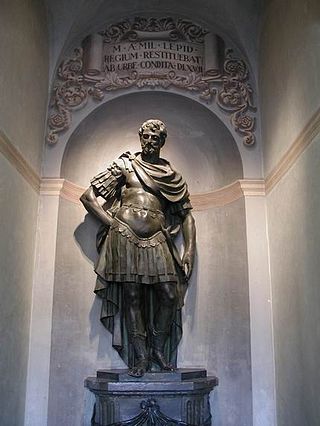
The gens Valeria was a patrician family at ancient Rome, prominent from the very beginning of the Republic to the latest period of the Empire. Publius Valerius Poplicola was one of the consuls in 509 BC, the year that saw the overthrow of the Tarquins, and the members of his family were among the most celebrated statesmen and generals at the beginning of the Republic. Over the next ten centuries, few gentes produced as many distinguished men, and at every period the name of Valerius was constantly to be found in the lists of annual magistrates, and held in the highest honour. Several of the emperors claimed descent from the Valerii, whose name they bore as part of their official nomenclature.
Marcus Valerius Messalla Corvinus was a Roman general, author, and patron of literature and art.

Marcus Aemilius Lepidus was a Roman consul, Pontifex Maximus, Censor and Princeps Senatus. A scion of the ancient Patrician gens Aemilia, he was most likely the son of Marcus Aemilius Lepidus, with his brothers being Lucius and Quintus.
Gaius Papirius Carbo was a Roman orator and politician.
Gaius Papirius Carbo Arvina was a Roman orator and politician. He was an opponent of the reforms championed by the tribune Marcus Livius Drusus and the orator Lucius Licinius Crassus, and held the plebeian tribunate the year following Drusus's murder. He held senior state positions in the interlude between the civil wars of 87 and 83 BC, when his cousin, Gnaeus Carbo, dominated the government. Nevertheless, during the war in 82 his loyalty was seen as suspect, causing Arvina to be murdered by government agents during a meeting of the Senate.
Gaius Valgius Rufus, was a Roman senator, and a contemporary of Horace and Maecenas. He succeeded Marcus Valerius Messalla Corvinus as suffect consul upon the latter's death in 12 BC. Rufus is best known as a writer of elegies and epigrams, and his contemporaries believed him capable of great things in epic writing. The author of the panegyric on Messalla Corvinus compared Rufus as the equal of Homer.
The gens Papiria was a patrician family at ancient Rome. According to tradition, the Papirii had already achieved prominence in the time of the kings, and the first Rex Sacrorum and Pontifex Maximus of the Republic were members of this gens. Lucius Papirius Mugillanus was the first of the Papirii to obtain the consulship in 444 BC. The patrician members of the family regularly occupied the highest offices of the Roman state down to the time of the Punic Wars. Their most famous member was Lucius Papirius Cursor, five times consul between 326 and 313 BC, who earned three triumphs during the Samnite Wars. Most of the Papirii who held office under the later Republic belonged to various plebeian branches of the family. Although the most illustrious Papirii flourished in the time of the Republic, a number of the family continued to hold high office during the first two centuries of the Empire.

Via Tiburtina is an ancient road in Italy leading east-northeast from Rome to Tivoli and then, with the Via Valeria, on to Pescara.
Marcus Valerius Messalla Corvinus was a Roman Senator who lived in the Roman Empire in the 1st century. He might have been the brother of empress Messalina.
Gnaeus Domitius Ahenobarbus was tribune of the people in 104 BC. He was the son of Gnaeus Domitius Ahenobarbus, and brother of Lucius Domitius Ahenobarbus. The College of Pontiffs elected him pontifex maximus in 103.
Marcus Valerius Messalla Niger was a senator of the Roman Republic.
Marcus Valerius Messalla was a Roman Republic consul in 226 BC.
Marcus Valerius Messalla was a consul of the Roman Republic in 161 BC.
The gens Otacilia, originally Octacilia, was a plebeian family at ancient Rome. The gens first rose to prominence during the First Punic War, but afterwards lapsed into obscurity. The first of the family to obtain the consulship was Manius Otacilius Crassus, in 263 BC.
Marcus Valerius Messalla Rufus, was a Roman senator who was elected consul for 53 BC.
The gens Domitia was a plebeian family at ancient Rome. The first of the gens to achieve prominence was Gnaeus Domitius Calvinus, consul in 332 BC. His son, Gnaeus Domitius Calvinus Maximus, was consul in 283, and the first plebeian censor. The family produced several distinguished generals, and towards the end of the Republic, the Domitii were looked upon as one of the most illustrious gentes.
Manius Otacilius Crassus was a Roman statesman and general of Samnite origins who served during the middle era of the Roman Republic. He was one of the two consuls of 263 BCE, serving with Manius Valerius Maximus Corvinus Messalla. During their consulship they fought in the First Punic War on Sicily. Their first campaign was against Syracuse; Hieron of Syracuse negotiated terms. They then marched against the Carthaginians; receiving the surrender of several Greek communities who were previously aligned with Carthage. He was consul for the second time in 246 BCE, serving with Marcus Fabius Licinus.
Marcus Valerius Messalla Barbatus, was a Roman politician in the 1st century. He was the father of empress Messalina.


